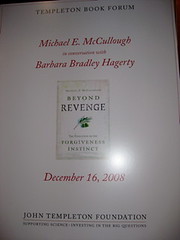
It’s important to me to enjoy arguments from other perspectives. For one, it allows me to dialogue withothers, two, it helps me maintain some possibility of open-mindedness and three, it sharpens my thinking.
Please do not presume that I understand or can understand McCullough’s points from an hour’s worth of discussion on a Tuesday night. Further, I have not read Beyond Revenge and this post is not in any way a rebuttal to McCullough’s book but this more of an exercise in responding to what I gained from the night.
As mentioned in the previous post, I really enjoyed McCullough’s dialogue but throughout the evening I couldn’t help but think what he was referring to the effects of human evolution is what my Christian perspective refers to it as part of our sinful, human nature (or to borrow other Biblical language, “the flesh”).
I am assuming from the subtitle that “revenge” has evolved in human nature. This is an odd thing for me to understand and while I am happy in admitting my shortcoming in comprehending this, revenge seems to be a very instinctual and obvious response to wrong doing. I’d like to argue that if one can plot against another, it would be just as easy to exact revenge (or retaliate by plotting against if the idea is to avoid the concept or word “revenge”. And what was it before it evolved into “revenge”).
The Christian tradition seems to be the likely explanation for revenge. “The Fall”, serves as the moment that we as humanity chose our own ways. In my economy of thought, selfishness should come quite easy to us; at least it comes naturally to me. I couldn’t help but feel that had I changed the wording of McCullough’s words, I could have made this a case for Christianity.
And again, I remind you, I have not read the book, nor am I arguing against it but instead responding to what I heard that night at the forum. This is purely amateur and remember, it’s a blog post. Now, I believe the book is more interested in arguing for the evolution of forgiveness. Certainly that is a more appealing concept and forgiveness has to sell more books than revenge (unless we’re marketing to failed republican presidential candidates, ex-girlfriends and the like).
Arguing for an evolving forgiveness seems like a better case and I think I like the end result. Imagine a world where forgiveness trumps acts of revenge. Will this not lead to world peace? Now world peace may not solve all of humanity’s problems but it sure takes care of a bunch of them. From images like the lion laying down with the lamb to movies that warn us from our self-caused Armageddon, we have this dream that eventually we can resolve our differences and exist in peace. It’s actually a really great dream and I share it. {need something here}
First, let’s assume that macro-evolution is true and that we have descended from the caveman (and prior to that, the primate) Even with the coming of society, it seems that we should have less violence today. (I know, I know, evolution is a slow process). Second, what will forgiveness evolve into in the future aside from less violence and more reconciliation among a greater number of people? Will we as a humanity occupy ourselves with more important matters like caring for the poor, sick, depressed, and marginalized? Will we not only forgive but love the offender? Will we turn the other cheek, go the extra mile, and feed our enemies? Is it evolution we need? Because I’d like to make the case that even if Christianity is a made-up religion, it offers a great vision for forgiveness and seems to have done more in 2000 years than the millions of evolution.
Now what if Christianity is not a made up religion? What if there is a divine God behind it? Does this mean then that forgiveness is super-natural or some kind of indication of the supernatural? Hmmm. Are those outside the Christian faith capable of this super-natural forgiveness? Certainly. In fact, over the years, some of the best people I’ve met are professing atheists/agonistics. In fact, over the years some of the best people I’ve met were former professing atheists/agnostics. I believe over the years that many good and moral atheists have advanced the Kingdom of God (and that many of them are pre-Christians). I believe over the years that many wrong-hearted, professing Christians have impaired the cause of Christ (and many times it’s been me).
If there is a God of love, it would seem that He is more interested in calling all people to peace with Himself and with each other. My theology is not universal. I believe very strongly in the personal freedom of the soul meaning God has allowed us to choose who/what we worship. But if the goal of life is to live in peace and harmony with each other, I have to ask, why wait for evolution to continue its course, why not become a Christian?





Speak Your Mind